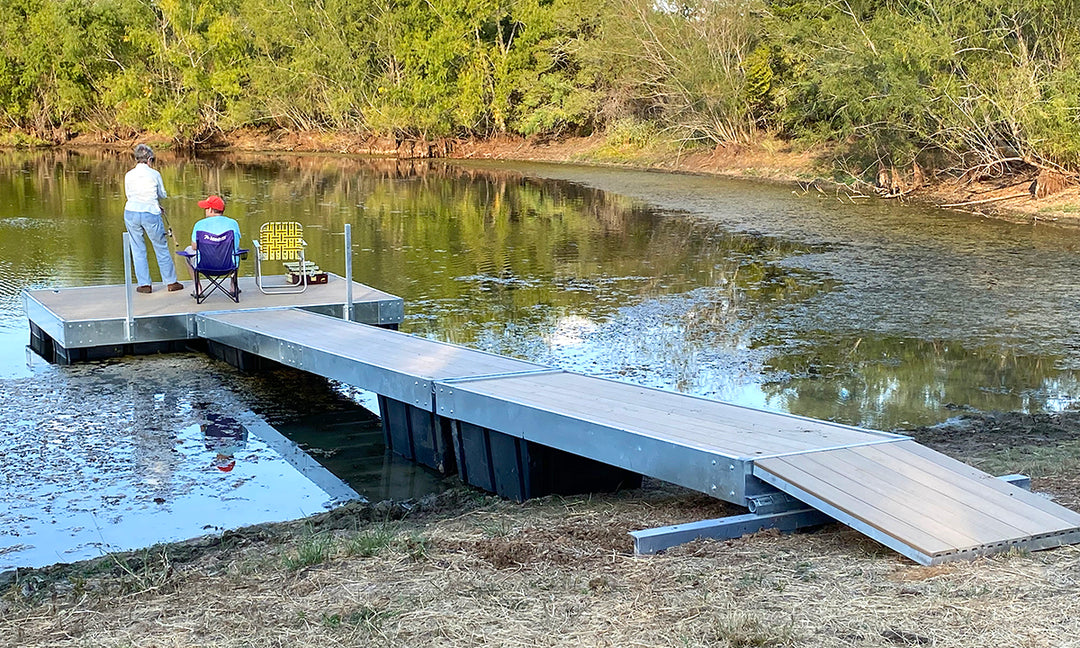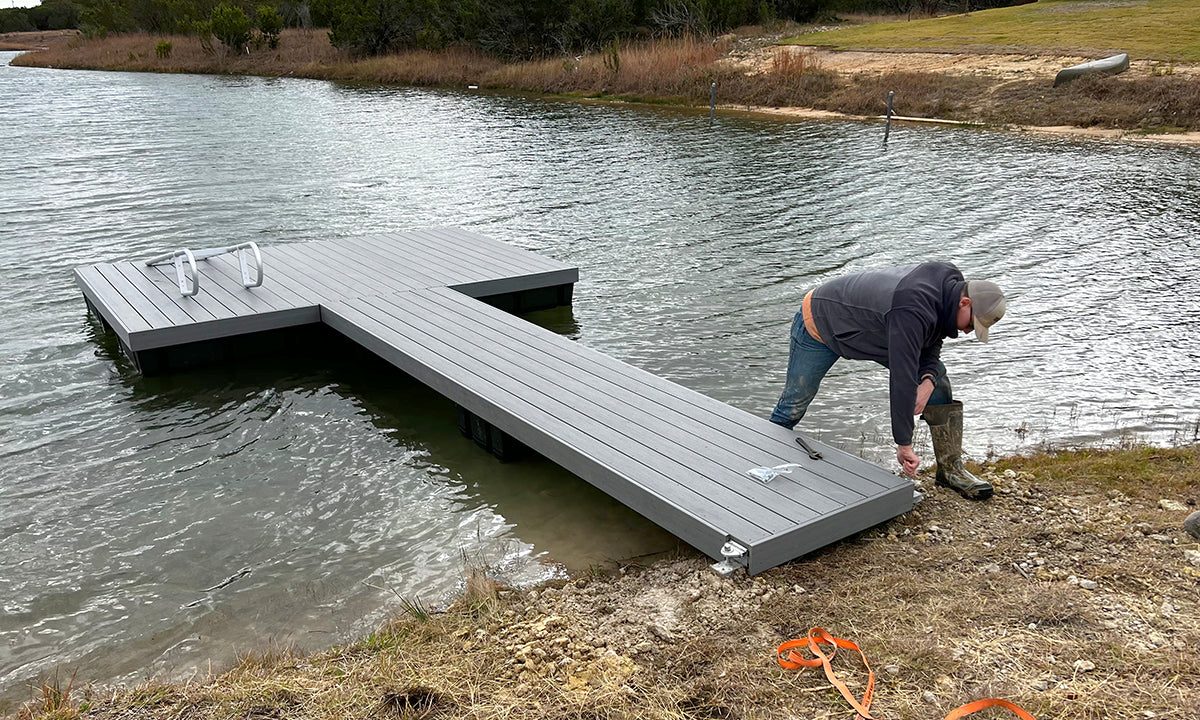The Importance of Quality in Floating Dock Builder Selection for Long-Lasting Docks
The Importance of Quality in Floating Dock Builder Selection for Long-Lasting Docks
Blog Article
The Ultimate Overview to Selecting the Best Floating Docks
Choosing the perfect floating dock requires an extensive understanding of various aspects that affect both performance and long life. Aspects such as dock kinds, products, and important attributes considerably affect your decision-making process.
Comprehending Floating Dock Kind
When picking a drifting dock, it is necessary to understand the numerous kinds readily available, as each serves unique objectives and applications. Floating docks mostly fall under 3 classifications: modular, stationary, and pontoon docks.
Modular docks are made up of individual sections that can be quickly put together or reconfigured, making them ideal for transforming water degrees and diverse uses, such as entertainment activities or business procedures. Their flexibility permits modification based on particular requirements.

Pontoon docks are characterized by their resilient framework, usually made up of several pontoons that offer stability and assistance. They are specifically appropriate for bigger vessels and are frequently used in marinas or for beachfront properties. Comprehending these types help in choosing the most proper floating dock to satisfy specific requirements, guaranteeing optimal functionality and safety.
Key Products for Toughness
Picking the appropriate products for floating docks dramatically effects their resilience and longevity. One of the most common materials include wood, plastic, metal, and composite products, each offering unique advantages and restrictions.
Wood, typically preferred for its aesthetic allure, requires routine maintenance to stand up to dampness and degeneration. Pressure-treated lumber can enhance resistance to rot, however it may still be susceptible to pests and weathering.

Plastic docks, constructed from high-density polyethylene (HDPE), are immune to deterioration, UV radiation, and impact, making them a popular option for coastal environments. Their lightweight nature additionally helps with easy installment and relocation.
Steel docks, commonly created from light weight aluminum or galvanized steel, offer extraordinary stamina and toughness. They are resistant to rust, specifically when treated, yet might require extra insulation to avoid heat accumulation in hot environments.
Composite products, integrating timber fibers and plastics, provide the advantages of both timber and plastic, withstanding dampness and fading while needing minimal maintenance. - floating dock builder
Ultimately, the selection of products need to line up with environmental conditions, intended usage, and maintenance choices to guarantee the floating dock remains functional and aesthetically pleasing with time.
Necessary Attributes to Consider
While the option of products is essential, thinking about necessary features for floating docks is just as essential to ensure optimum performance and user contentment. One vital function to analyze is the dock's buoyancy ability, which figures out how much weight it can sustain without immersing. floating docks. This is important for accommodating boats, personal boat, and even entertainment activities
Additionally, mobility is a substantial consideration. Relying on your needs, you might desire a dock that is easy to deliver and take apart, specifically if you prepare to transfer it seasonally. Stability is one more vital feature; a well-designed floating dock needs to lessen activity brought on by wind and water currents, supplying a secure system for individuals.
Safety and security features, such as non-slip surfaces and rounded sides, are additionally critical to stop crashes, specifically in wet conditions. Moreover, think about the accessibility of accessories, such as bumpers, ladders, and cleats, which can boost the functionality of your dock.
Setup and Maintenance Tips
Establishing and keeping a floating dock needs careful planning and interest to detail to guarantee its durability and optimal performance. Begin by selecting a proper place that reduces exposure to solid currents and waves, which you can try here can cause deterioration. Make certain that the water depth is sufficient for the dock's height and that it is secured safely to avoid movement.
Throughout installation, adhere to the manufacturer's guidelines very closely, as incorrect setting up can jeopardize stability. Usage top quality materials resistant to corrosion, such as aluminum or treated timber, to enhance resilience. On a regular basis inspect all parts, consisting of floats, connectors, and securing systems, for indicators of damages or wear.
If your dock makes use of flotation protection gadgets, ensure they continue to be complimentary and undamaged from slits. By sticking to these installation and maintenance tips, you can appreciate a functional and reliable floating dock for years to come.
Budgeting for Your Dock
Budgeting for your dock is a crucial action that can substantially influence your total fulfillment and financial investment in a waterside property. Establishing a clear budget helps you browse the numerous alternatives readily available and ensures you make notified decisions that straighten with your monetary capabilities.
Begin by figuring out the size and style of the dock you need, as these variables will significantly affect the expense. Floating docks can differ considerably in price, depending on products, buoyancy, and attributes like devices and ramps. Study various makers and distributors to contrast prices and comprehend the market value.
In enhancement to preliminary costs, take into consideration ongoing costs such as upkeep, insurance policy, and prospective repair services. Allot funds for these repeating costs to prevent surprises down the line. It's also prudent to allocate any necessary permits or examinations, which might be required by regional laws.
Last but not least, keep in mind the potential roi. A well-planned dock can boost your find more building's value and allure, supplying a favorable monetary effect in the long-term. By budgeting efficiently, you can make certain that your dock meets your requirements without jeopardizing your monetary security.
Verdict
In final thought, choosing the suitable floating dock necessitates a complete examination of numerous elements, consisting of dock types, materials, crucial features, and setup procedures. Cautious factor to consider of budgetary restrictions will even more make sure a sound investment.

While the selection site here of materials is crucial, considering crucial functions for floating docks is just as important to make certain ideal performance and customer complete satisfaction.Setting up and maintaining a drifting dock needs mindful preparation and focus to detail to guarantee its durability and optimum performance. Floating docks can vary substantially in cost, depending on materials, buoyancy, and attributes like ramps and devices.In final thought, selecting the perfect floating dock necessitates a thorough evaluation of different factors, including dock types, materials, necessary features, and setup procedures.
Report this page